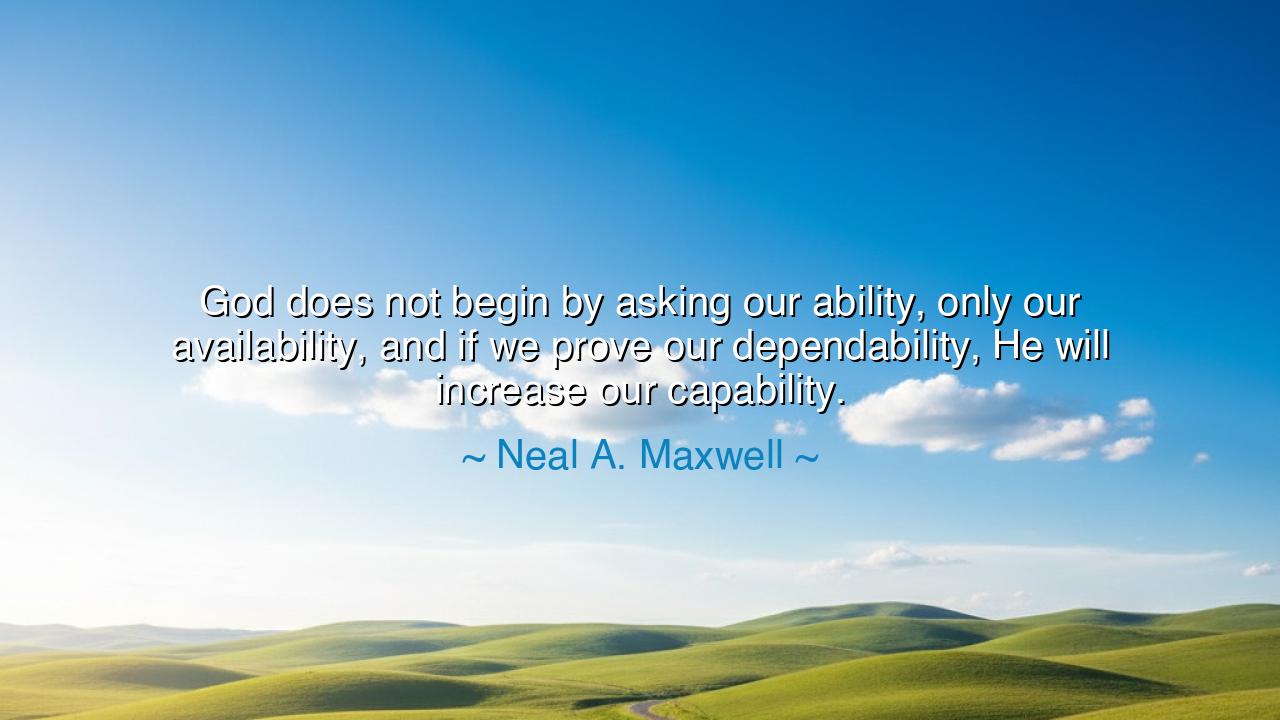
God does not begin by asking our ability, only our availability
God does not begin by asking our ability, only our availability, and if we prove our dependability, He will increase our capability.






Hear the wise and gentle words of Neal A. Maxwell, a servant of God and apostle of faith, who declared: “God does not begin by asking our ability, only our availability, and if we prove our dependability, He will increase our capability.” In these words, radiant with both humility and power, lies a profound truth about the nature of divine service and human growth. Maxwell, a man who knew both pain and purpose, spoke from the furnace of experience—teaching that God’s work is not reserved for the gifted, but for the willing; not for the perfect, but for the faithful. He revealed that Heaven values readiness over brilliance, obedience over talent, for divine strength is made perfect in human weakness.
The origin of this quote springs from Elder Maxwell’s deep reflections on discipleship, drawn from the doctrines of the Restored Gospel of Jesus Christ. Throughout his ministry, he often spoke of the refining power of submission and the beauty of consecrated effort. He knew that when God calls, He does not seek the already capable—He seeks the willing heart. Like the potter with clay, God shapes His servants through obedience, endurance, and faith. The miracle of discipleship is not that God finds perfect vessels, but that He perfects the imperfect through use. Thus, availability becomes the gateway to divine partnership; through simple willingness, one invites heaven to act through mortal hands.
This principle is as old as Scripture itself. Consider Moses, who trembled before the burning bush, declaring, “I am slow of speech.” He saw only his lack; God saw a leader. Or David, the shepherd boy with no armor, chosen to fell a giant. Or Mary, the humble maiden who said simply, “Be it unto me according to Thy word.” None of these were chosen for worldly skill—they were chosen for their availability, for hearts willing to trust divine will over human fear. And when they proved dependable, God magnified them beyond measure. The timid became prophets, the obscure became kings, and the lowly became the mother of the Savior. Each began with nothing but surrender, and through surrender, gained everything.
Maxwell’s words remind us that God’s pattern of calling the unqualified is not by accident—it is His design. For if He called only the skilled, the proud heart would claim the glory; but when He calls the humble, the results testify of divine power. This is how God works: He takes a fragment of clay and makes it a cornerstone. He takes a whisper of faith and turns it into thunder. The story of the Apostle Peter reveals this divine pattern. Once impulsive and uncertain, Peter denied his Lord; yet when he chose to stand again, Christ entrusted him to “feed My sheep.” His failure did not disqualify him; his dependability after failure made him strong enough to lead.
To prove our dependability is to remain steadfast when the call of God seems inconvenient, when faith feels heavy, or when recognition does not come. It is in the quiet hours of unseen labor that God measures the heart. When one prays, “Here am I, send me,” as Isaiah did, the true test follows not in the calling, but in the continuing—in the endurance to keep going when the path grows steep. Dependability is the bridge between availability and capability. The longer one walks faithfully in God’s service, the greater one’s capability becomes, for divine trust increases with divine purpose.
History abounds with this truth. Think of Florence Nightingale, who as a young woman felt an inner summons to heal the suffering. She was not a general, nor a politician, but a nurse with conviction. When war came, she answered that call—available, dependable, unflinching. Through her, the wounded found light in darkness, and the world learned compassion through discipline. Her strength was not born of natural power, but of divine capability awakened by willingness. God had not asked her to be great; He asked her to be faithful, and through faithfulness, she became great.
Thus, Elder Maxwell’s teaching stands as both invitation and warning. Do not wait until you feel capable before answering God’s call. Capability is the fruit of obedience, not its prerequisite. God does not need your perfection; He desires your participation. Offer Him your hands, your voice, your heart—even if trembling—and He will strengthen them beyond what you thought possible. The greatest tragedy is not inadequacy, but unwillingness; not failure, but inaction.
And so, O child of eternity, take this truth as your guide: make yourself available to God, even when you feel unworthy. Be dependable in the small things, and He will entrust you with greater. Let your faith be the seed, your service the soil, and your perseverance the sunlight. In time, God will multiply your capability until your weakness becomes strength and your ordinary life becomes extraordinary in His hands. For the Creator of the universe seeks not the mighty, but the willing—and with one willing heart, He can change the world.






AAdministratorAdministrator
Welcome, honored guests. Please leave a comment, we will respond soon